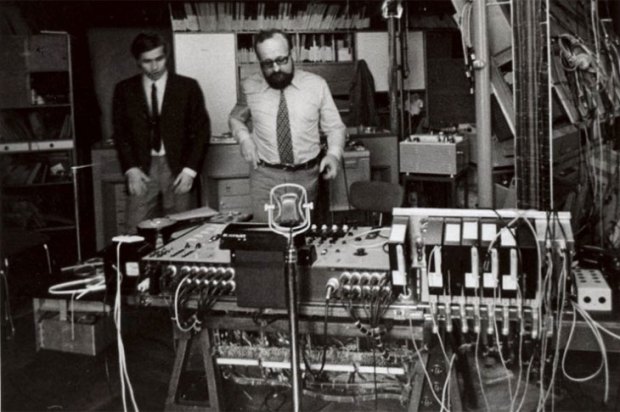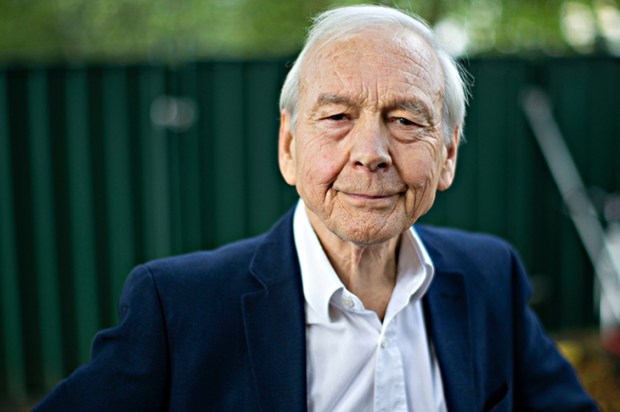‘He was a natural broadcaster,’ said Nick Higham, after the death last week of the rugby player and sports broadcaster Cliff Morgan. I wondered what he meant. ‘Natural’ as in born to the task? Or ‘natural’ as in his ability to communicate as if chatting directly to you, and only you, with no pretension or affectation, just a desire to tell a good story, to convey his enthusiasm?
I still miss Morgan on Saturday mornings. He had such a warm voice, and something more: a real and genuine interest in the stories behind the athletes, tennis stars, rugby players, basketball champions, wrestlers, rowers, cyclists, swimmers, gymnasts, equestrians he chatted to on Sport on Four, which disappeared from the airwaves in 1998. (I never forgave John Peel for replacing Morgan’s sporting truths with Home Truths.) Morgan’s conversation was always prompted by sporting achievement, but it was never limited by that. Yes, shot-put is brilliant, archery totally absorbing, synchronised swimming a hoot. But what makes sport interesting to non-sporty types like me? Morgan understood how to keep us engaged by giving us the human dimension, the back story. He could even persuade me that football was worth watching.
All Morgan needed to keep us listening was a mike and mixing board — but also the electricity to power up the studio. On Thursday Radio 5 Live tried to survive for 12 hours without the National Grid. As a gimmick with a purpose, a vast inflatable dome was set up outside 5 Live’s base at Media City from which to broadcast for the day. At least that was the intention. This column will go to press before the solar panels, wind turbines, humanly inspired kinetic energy (via a peloton of exercise bikes) and back-up biofuel (a vat of old chip fat from the BBC canteen) have been properly put to the test. Will Richard Bacon’s flow of conversation falter mid-afternoon as the kilowatts drop below the essential six required to keep him going? Will the phone lines go down just as the energy secretary is poised to answer questions on the government’s plans for keeping Britain in lights for the next 25 years?
It has been calculated that 72 kilowatt-hours of energy will need to be produced by the renewable sources to stay on air for 12 hours non-stop. Online, a graph will show how many kilowatts are currently available and how the different sources of energy are contributing minute-by-minute. It’s an intriguing exercise to make us all aware of the cost of switching on the radio. We do it without thinking but each time we listen we are taking energy out of the grid (unless we’ve hung on to our battery-operated transistors). Could there be a time when programming is rationed? If so, what eight programmes would you keep as required listening?
High on my list would be Radio 4’s The Reunion, which this week reached its 100th edition. On Sunday Sue MacGregor presented a programme remembering the events in Dallas, Texas, of 22 November 1963 through five people who were there when President Kennedy was shot. Gradually, and with marked restraint, she built up a picture of what happened on that awful day through their words and some archive material. Gayle Newman and her husband had taken their young children to see the president and were standing on the sidewalk right on the edge of the kerb as the first shot rang out at 12.30 p.m. At first Newman thought it was a firecracker, but when she heard the second shot she grabbed her children, threw them to the ground and lay down on top of them as a shield.
What did she remember next? At the third shot, ‘you could see the bits of flesh flying through the air’. That shot, we were told, had penetrated the right-hand side of the president’s head. Meanwhile Clint Hill was a secret service agent serving as Jackie Kennedy’s bodyguard and was travelling in the car behind the president’s. He watched the president’s wife ‘trying to gather up the material that came out of the president’s head’. Not a word was wasted by anyone, as if they had told of what they had seen so many times it was now boiled down to its essence.
It was extraordinary to listen to this powerful retelling of the story (produced by Colin McNulty) just a few days after hearing Radio 4’s re-enactment of Martin Luther King’s ‘I Have a Dream’ speech, which he delivered on 28 August 1963. It was such a vivid reminder of how close in time were the two so different events. The ‘soft’ power of the BBC was on full display in I Have a Dream as a whole host of international peacemakers from the Dalai Lama and Mary Robinson to Malala Yousafzai and Stevie Wonder united to deliver the speech in full. Catch it on iPlayer and be inspired.
Got something to add? Join the discussion and comment below.
Get 10 issues for just $10
Subscribe to The Spectator Australia today for the next 10 magazine issues, plus full online access, for just $10.
You might disagree with half of it, but you’ll enjoy reading all of it. Try your first month for free, then just $2 a week for the remainder of your first year.













Comments
Don't miss out
Join the conversation with other Spectator Australia readers. Subscribe to leave a comment.
SUBSCRIBEAlready a subscriber? Log in